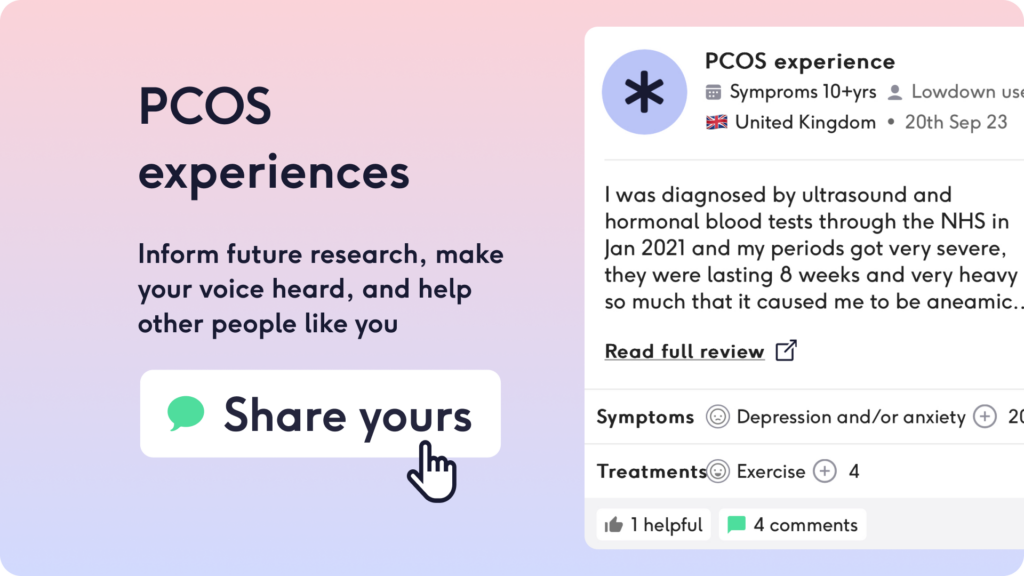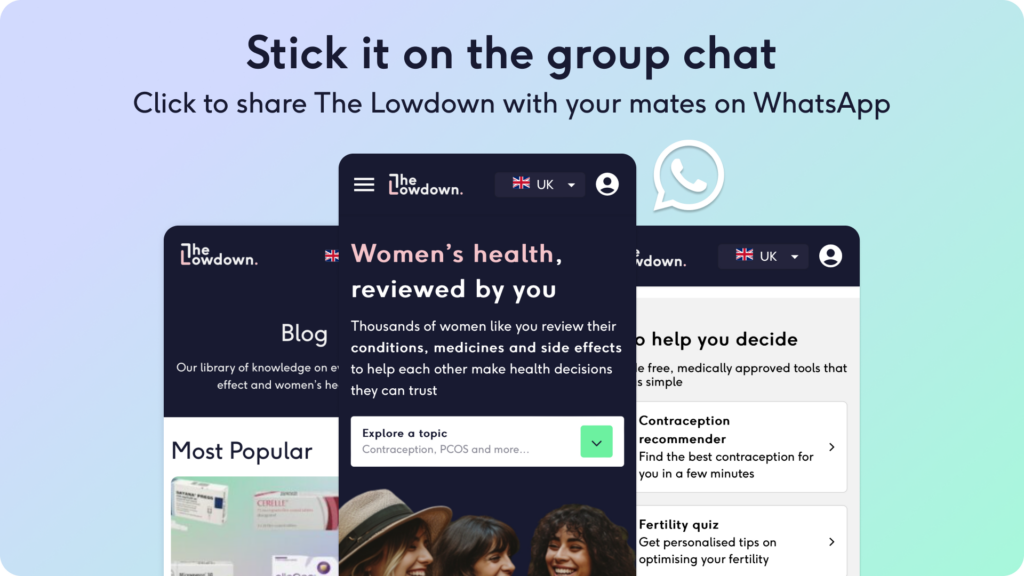
How to tell which type of PCOS you have
The basics of PCOS
Polycystic ovary syndrome (PCOS) is a common condition affecting up to 26% of women and AFAB folk1. It is a hormonal imbalance that causes “hyperandrogenism”, meaning there is more testosterone (a typically male hormone) in the blood than usual…..which causes PCOS symptoms that can be frustrating, such as acne, excess hair growth on the body, oily skin, hair loss from the scalp and weight gain. Your ovaries may not release an egg each month, which can cause irregular or missed periods. But everyone’s experience of PCOS is different… leading to the idea of different PCOS types.
Why are there different types? What causes them?
Rather than thinking of these as separate types of PCOS, we should think of them more as different expressions of the same condition; hyperandrogenism. Remember, not everyones’ experience of PCOS is exactly the same, and how it is managed may vary depending on the different types. Knowing what the causes, symptoms and side effects are, may help you to understand your type of PCOS so you can best manage it.

The four types of PCOS according to mainstream medicine
Depending on what resource you read, you may find different classifications for the types of PCOS. The criteria healthcare professionals use to diagnose PCOS also vary, but the bottom line is that androgen excess is implicated in some way. At The Lowdown, we suspect the title PCOS will disappear in years to come and be replaced by names for each type (you read it here first).
Rather than calling the condition PCOS (which doesn’t describe someone’s symptoms specifically enough), the consensus from research says that it’s better to break PCOS down into what symptoms are experienced. These are broken down by medics into “phenotypes” which is a word to describe how our genetic blueprint is expressed in the world
Phenotype A – Full PCOS
This person has the combination of hyperandrogenism, ovary dysfunction (irregular or no periods) and polycystic ovaries on a scan, in other words, has the “classic” type of PCOS described in textbooks.
Phenotype B – Non-polycystic ovary PCOS
This means that an individual has the effects of hyperandrogenism, and their ovaries are impacted. Weight gain, hirsutism, acne, difficulty getting pregnant and irregular periods would be symptoms for this person. But their ovaries are not polycystic on an ultrasound scan.
Phenotype C – Ovulatory PCOS
In this situation, a person has symptoms of hyperandrogenism and polycystic ovaries (seen on scan), but they don’t have ovarian dysfunction, meaning that trying to conceive is easier and periods are more regular.
Phenotype D – Non-hyperandrogenic PCOS
For this person, the ovaries look polycystic and they don’t function properly, but they don’t have the symptoms of hyperandrogenism.
| Phenotype | Androgen Excess (acne, hair growth, weight gain) | Polycystic ovaries seen on ultrasound scan | Dysfunction of ovulation (irregular or no periods, difficulty conceiving) |
|
AFull PCOS syndrome |
✓ | ✓ | ✓ |
|
BNon-PCO PCOS |
✓ | ✓ | |
|
COvulatory PCOS |
✓ | ✓ | |
|
DNon-hyperandrogenic PCOS |
✓ | ✓ |
The four types of PCOS – according to alternative medicine
There are four different types of PCOS which are explained in functional (or alternative) medicine circles. These types have not been as robustly researched by mainstream medicine, but they attempt to break down the mechanisms behind why PCOS develops. It may help you to know what discussions are taking place when you come to do further research for yourself.
Insulin-resistant PCOS
This affects the entire body and is classically what we would associate with textbook PCOS (phenotype A above). Insulin is a hormone produced by the pancreas and is released when we eat. Insulin signals to the cells of the body to use sugar or store it in the liver or as fat so we can use it later. In insulin-resistant PCOS, over time, the cells of the body have a poorer response to the insulin signals. The levels of insulin therefore need to get higher and higher to store sugar, so sugar remains in the bloodstream and can affect your health in the long term with an increased risk of diabetes and heart disease. To keep this at bay, many people with PCOS find lowering sugar or simple carbohydrates in their diet can help symptoms and overall health.
Insulin resistance also leads to high levels of circulating androgens in the body and produces the symptoms of PCOS such as weight gain, acne, hirsutism and hair loss on the scalp.
Not everyone will have insulin resistance as part of their PCOS experience. Some of the signs that suggest you may have insulin resistance are:
- you have gained a lot of weight and your periods have reduced/changed
- you’re struggling to conceive
- you have a family history of diabetes
- you have had pregnancy-induced diabetes
- you have all the classic symptoms of hyperandrogenism as described above.
Inflammatory PCOS
Chronic inflammation can be another route to developing PCOS. Stress, inflammatory diets (such as highly processed foods high in saturated fat, refined sugar and flour), environmental toxins and family genetics can all play a role in developing this.
The chronic inflammation is thought to impact on how the ovaries function, leading to the classic hyperandrogenic symptoms and irregular periods. We’re not sure how inflammation directly impacts the ovaries, though.
Post-pill PCOS
Many people worry that being on the pill causes polycystic ovary syndrome but we want to reassure you that this is not the case. PCOS cannot be caused by the pill, but as the pill treats PCOS symptoms, PCOS is often not diagnosed until you stop taking the pill. Periods can take a few months to return after stopping (sometimes up to 6 months), but it isn’t necessarily due to PCOS.
If more than 6 months have gone by and your period hasn’t returned, speak to a doctor at The Lowdown, or your own healthcare provider for advice.
Adrenal PCOS
This type of polycystic ovary syndrome is related to raised DHEA levels – an androgen hormone produced by the adrenal gland which sits above your kidneys. One study tested the adrenal function of 38 patients with PCOS and found that 15 of them produced more adrenal hormones than would be considered normal10. No one really knows why this happens yet, but stress is implicated. More studies are needed to find out why.
How can you tell which PCOS type you have?
Talking to a doctor to consider further investigations like blood tests and an ultrasound scan can help to pinpoint the classical medical phenotype of PCOS you have. It can be hard to tell which type of functional medicine PCOS you have because each type ultimately leads to similar sets of symptoms – nutritionists, dieticians or functional medics could help more with this.
Are there different ways to manage the types of PCOS?
It doesn’t really matter what type of PCOS you have, what matters is how you look after yourself going forward. You should try to keep an eye on your periods, your heart and circulation health, stress levels, your weight, and your diet.
It’s important to seek regular input from a healthcare professional to manage your PCOS in the best way possible, as PCOS can affect your long term health. If you don’t have many periods, you may need some medication to help protect your womb lining from overgrowing and you should be having yearly checks for diabetes, cholesterol levels, blood pressure and overall health. You might be able to seek support for weight loss if needed and get help when trying to conceive
We understand that you may struggle to find answers, which is why you can read PCOS experiences to learn from and connect with others who have been through it on The Lowdown.
When should you talk to your doctor?
If you have any concerns about PCOS, start talking to a doctor early. Tracking your symptoms is a great place to start and opens up an easier conversation. It can help to record your periods for 3 months and see if you can spot any patterns in your cycle. While you are having tests for PCOS (which may include blood tests or an ultrasound), you can discuss the type of PCOS you may have with your doctor. Although remember, current medical treatment of all types of PCOS is still the same. To find out about effective treatments and to ask questions of our other community members, you can read PCOS experiences. And don’t forget to share your PCOS experience too to help others in the future.

Our medical review process
This article has been medically reviewed for factual and up to date information by a Lowdown doctor.






